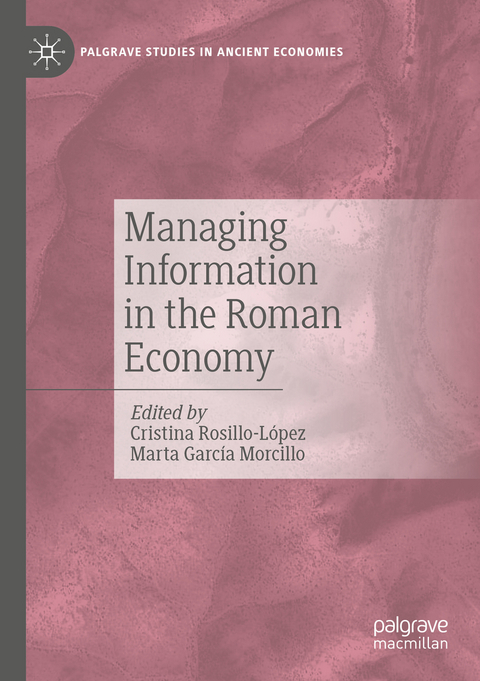
Managing Information in the Roman Economy
Springer International Publishing (Verlag)
978-3-030-54102-6 (ISBN)
This volume studies information as an economic resource in the Roman World. Information asymmetry is a distinguishing phenomenon of any human relationship. From an economic perspective, private or hidden information, opposed to publicly observable information, generates advantages and inequalities; at the same time, it is a source of profit, legal and illegal, and of transaction costs. The contributions that make up the present book aim to deepen our understanding of the economy of Ancient Rome by identifying and analysing formal and informal systems of knowledge and institutions that contributed to control, manage, restrict and enhance information. The chapters scrutinize the impact of information asymmetries on specific economic sectors, such as the labour market and the market of real estate, as well as the world of professional associations and trading networks. It further discusses structures and institutions that facilitated and regulated economic information in the public andthe private spheres, such as market places, auctions, financial mechanisms and instruments, state treasures and archives.
Managing Asymmetric Information in the Roman Economy invites the reader to evaluate economic activities within a larger collective mental, social, and political framework, and aims ultimately to test the applicability of tools and ideas from theoretical frameworks such as the Economics of Information to ancient and comparative historical research.
lt;p> Cristina Rosillo-López is Senior Lecturer in Ancient History at Pablo de Olavide University in Seville, Spain. She specializes in Late Republican politics and Roman Economy. She has worked on corruption, public opinion, rhetoric, and the real estate market in ancient Rome.
Marta García Morcillo is Senior Lecturer in Ancient History at the University of Roehampton, UK. She specializes in the Roman Economy and ancient socio-economic mentalities. Her published work revolves around notions of economic profit, and the study of Roman financial activities and trade, with special focus on sales and auctions.
1. Asymmetric Information and the Roman Economy: Introduction.- 2. Economics and Information: Asymmetries, Uncertainties and Risks.- Part 1: Information Management.- 3. Managing Economic Public Information in Rome: the Aerarium as Central Archive of the Roman Republic.- 4. Managing Uncertainty and Asymmetric Information in Roman Auctions.- Part 2: The Real Estate and Land Property Market.- 5. Asymmetric Information, ager publicus and the Roman Land Market in the Second Century BC.- 6. Domum pestilentem vendo: Real Estate Market and Information Asymmetry in the Roman World.- 7. Marriage and Asymmetric Information on the Real Estate Market in Roman Egypt.- Part 3: The Labour Market.- 8. Information Asymmetry and the Roman Labour Market.- 9. Asymmetric information and adverse selection in the Roman slave market: the limits of legal remedy.- Part 4: Trade and Financial Markets.- 10. Information Landscapes and Economic Practice in the Roman World.- 11. Roman Professional collegia andEconomic Control. A Monopoly of Information?.- 12. A case of Arbitrage in a Worldwide Trade: Roman Coins in India.- 13. Information Governance in Roman Finance.- 14.Conclusions.
"The book not only avoids generating unnecessary and unhelpful controversy, but is also ultimately successful in its aim to identify and analyse information asymmetries in a range of areas, most notably Roman real estate markets, labour and aspects of trade. ... this volume has the potential to introduce one of NIE's most practical concepts to a wider audience of students and researchers - including those who do not think of themselves as economic historians. Specialists will find the book's contents informed and engaging." (Colin P Elliott, The Classical Review, Vol. 72 (1), 2022)
“The book not only avoids generating unnecessary and unhelpful controversy, but is also ultimately successful in its aim to identify and analyse information asymmetries in a range of areas, most notably Roman real estate markets, labour and aspects of trade. … this volume has the potential to introduce one of NIE’s most practical concepts to a wider audience of students and researchers – including those who do not think of themselves as economic historians. Specialists will find the book’s contents informed and engaging.” (Colin P Elliott, The Classical Review, Vol. 72 (1), 2022)
| Erscheinungsdatum | 25.12.2021 |
|---|---|
| Reihe/Serie | Palgrave Studies in Ancient Economies |
| Zusatzinfo | XIII, 339 p. 6 illus. |
| Verlagsort | Cham |
| Sprache | englisch |
| Maße | 148 x 210 mm |
| Gewicht | 465 g |
| Themenwelt | Geisteswissenschaften ► Geschichte ► Regional- / Ländergeschichte |
| Geschichte ► Teilgebiete der Geschichte ► Wirtschaftsgeschichte | |
| Wirtschaft ► Allgemeines / Lexika | |
| Schlagworte | adverse selection • Ancient Roman Economy • Economic asymmetry • Economies of information • Management of information |
| ISBN-10 | 3-030-54102-9 / 3030541029 |
| ISBN-13 | 978-3-030-54102-6 / 9783030541026 |
| Zustand | Neuware |
| Informationen gemäß Produktsicherheitsverordnung (GPSR) | |
| Haben Sie eine Frage zum Produkt? |
aus dem Bereich


